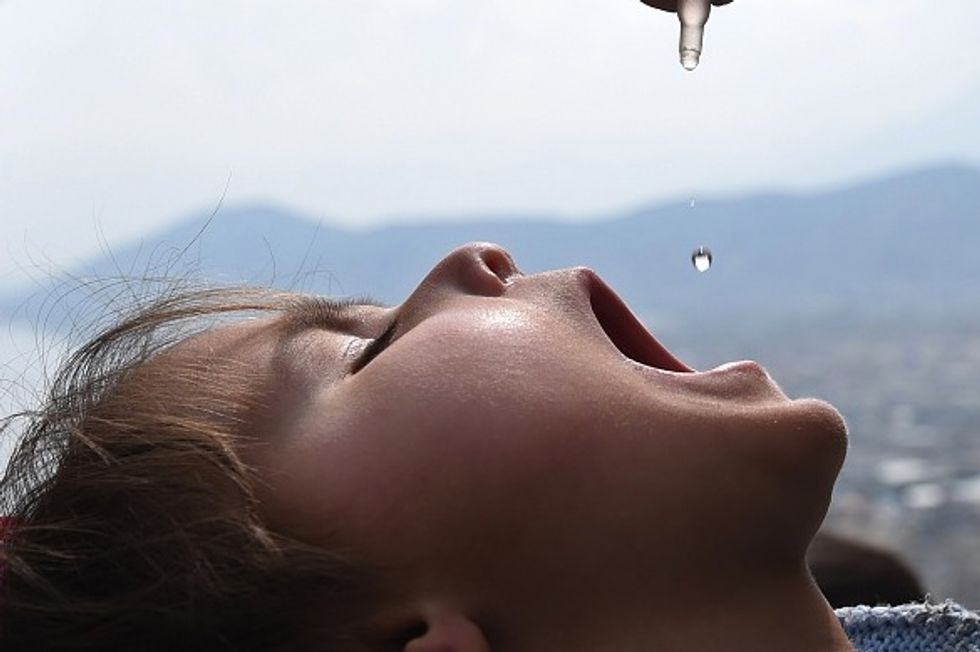
© 2026 Blaze Media LLC. All rights reserved.
West African Country Sees Its First Polio Case in Years After the Virus Mutated From an Oral Vaccine
September 08, 2015
"Immediate actions were taken to initiate appropriate and targeted immunization activities."
The West African country of Mali is seeing its first reported case of polio since 2011, but it's not from the "wild-type" strain.

A 19-month-old boy, originally from Guinea, has been paralyzed by what the World Health Organization calls vaccine-derived poliovirus type 2. This type, which has been traced back to the Kankan region of Guinea, from which it has been spreading internationally since 2014, resulted from a mutated poliovirus in the vaccine. In rare instances, the virus in the oral vaccine can evolve into a strain that causes new outbreaks.
The WHO said that the risk of this strain of the virus spreading is high and noted that it indicates low immunity in the population due to low vaccination rates in Guinea. The oral vaccine, the organization said, has to be administered many times to protect children and prevent outbreaks.
According to the Global Polio Eradication Initiative, the oral vaccine includes a live, but weakened, amount of the virus. As with a polio infection, the child who has receive the vaccine can excrete the virus, which the organization noted can rarely mutate, making it infectious to those who are exposed but not vaccinated.
Why use the oral type at all compared to the more traditional, injection vaccine, which includes a killed version of the virus that does not pose a risk for mutating? The New York Times noted that the oral vaccine is easier to administer in countries with fewer health professionals and reported that it also carries less risk for blood-borne diseases. Since 2000, only the injected vaccine is used in the United States, according to the Centers for Disease Control and Prevention.
GPEI said that once the wild-type of the poliovirus is eradicated globally, it then believes use of the oral vaccine should be phased out to reduce the risk of vaccine-derived outbreaks.
"As soon as the new virus was identified, immediate actions were taken to initiate appropriate and targeted immunization activities that are in line with the recent Global Polio Eradication Initiative guidelines,” Dr Lucien Manga, the acting WHO representative in Mali, said in a statement Monday.
To put the rarity of this type of polio infection into context, the Times reported that there were 55 cases of vaccine-derived polio resulting in paralysis in 2015 worldwide. But, in addition to this new situation in Mali, stemming from Guinea, two vaccine-derived polio cases were reported last week in Ukraine, making it the country's first cases of the paralytic disease in nine years. Ukraine was also reported to have low vaccination rates; only half of children were immunized against diseases like polio last year.
According to the CDC, most people infected with poliovirus will experience flu-like symptoms, which go away on their own, but some develop more serious, permanent conditions, such as paralysis. The virus can also be fatal.
—
The Associated Press contributed to this report.
Want to leave a tip?
We answer to you. Help keep our content free of advertisers and big tech censorship by leaving a tip today.
Want to join the conversation?
Already a subscriber?
more stories
Sign up for the Blaze newsletter
By signing up, you agree to our Privacy Policy and Terms of Use, and agree to receive content that may sometimes include advertisements. You may opt out at any time.
Related Content
© 2026 Blaze Media LLC. All rights reserved.
Get the stories that matter most delivered directly to your inbox.
By signing up, you agree to our Privacy Policy and Terms of Use, and agree to receive content that may sometimes include advertisements. You may opt out at any time.





